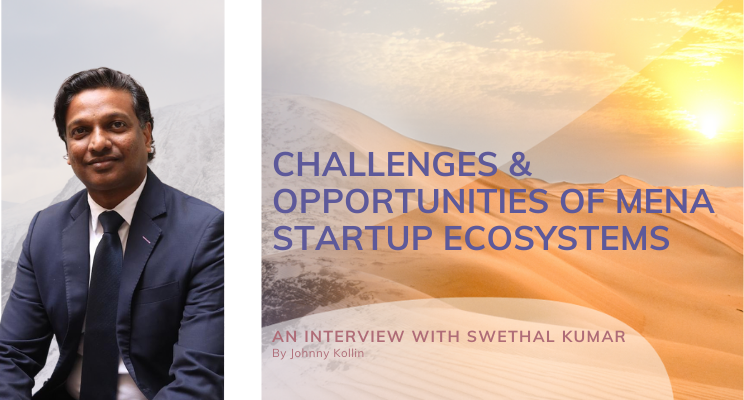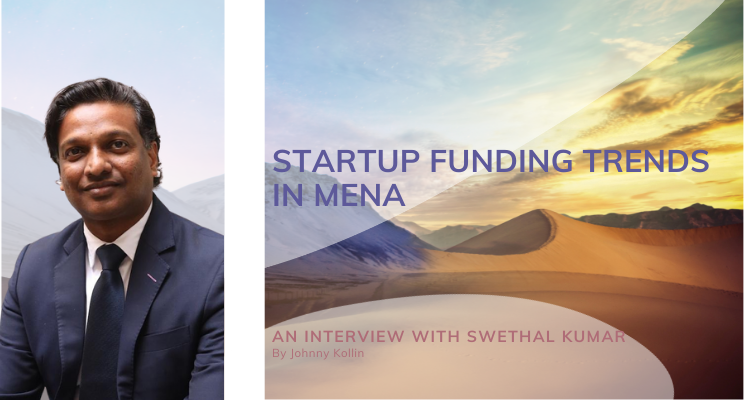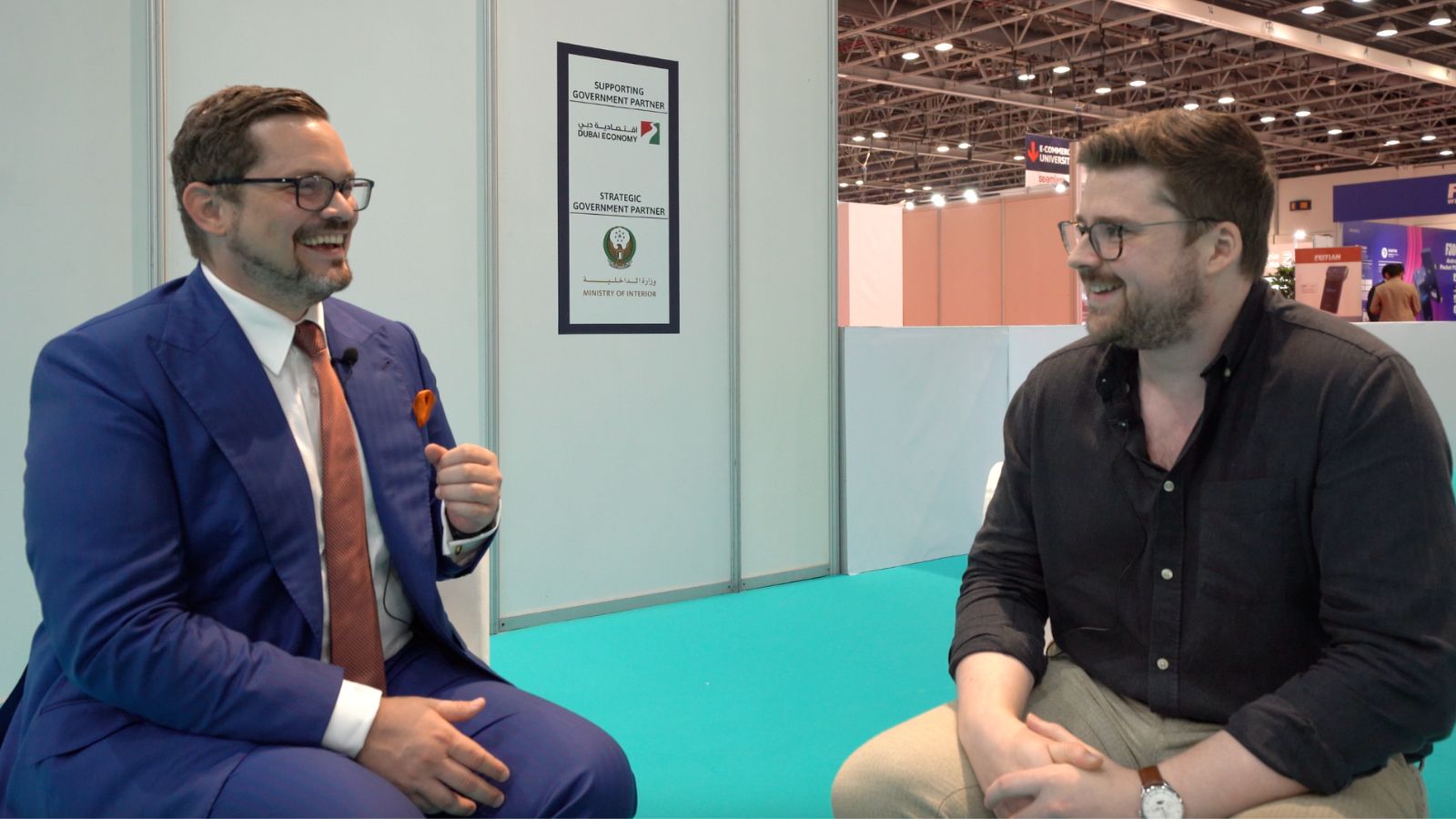1 min read
MENA Startup Funding Trends
Sourcing funding is a crucial objective for any startup. It was also a consistent discussion topic throughout Seamless Middle East 2021. Several of...
5 min read
Johnny Kollin
:
17 October 2021 15:02:00 GST

Seamless Middle East brings together the brightest minds from across e-commerce, retail, payments, fintech, identity and insurtech. Johnny Kollin caught up with Swethal Kumar on the sidelines of the 2021 Dubai edition of the conference on 29 September to discuss the startup climate, opportunities, and challenges in the Middle East and North Africa (MENA) region.

Johnny Kollin interviews Swethal Kumar on the sidelines of Seamless Middle East 2021. © Várri Consultancy
Kumar is the CEO and Managing Partner of the startup ecosystem builder StartupScale360 FZCO and Co-Founder of The Crossroads. He is also an angel investor, startup mentor, and strategic advisor with two decades of experience in the finance and strategy domains. With vast experience in organizational transformation and operational excellence, he spoke to Kollin about startup ecosystems in the MENA region and their opportunities and challenges.
Kumar attends Seamless Middle East to stay updated on the swift pace of change in the fintech sector, he said in an interview in Dubai. "There has been a lot of change over the last few years," said Kumar. With close to two decades in the region, including more than twelve years at Mubadala Group – one of the largest sovereign wealth funds in the world – Kumar has seen the development up close.
The transformation of the financial services sector to a large extent began in the aftermaths of the global financial crisis of 2007 to 2009, said Kumar. The failings of several financial institutions put pressure on banks to tighten their lending criteria and revise their loan origination processes. According to Kumar, that, in turn, opened the opportunity for market entrants to explore alternative financing solutions.
To build a startup ecosystem, you need to pool together all the key enablers.
The terms startup ecosystem and – in relation the fintech sector – fintech ecosystem are often used for describing the system composed of various market participants and organisations. "To build a startup ecosystem, you need to pool together all the key enablers," said Kumar. He mentioned regulators as playing a central role, alongside governments and government initiatives such as innovation labs, corporates, funding entities such as venture capital and private equity funds, mentors, thought leaders, service providers, and academia.
"The Middle East and North Africa region is still a young ecosystem," said Kumar. "But there are many opportunities here." "If you just go back five years, there was no ecosystem," except for incubators and a few acceleration programs.
But this has changed, according to Kumar, with several governments applying a top-down approach to develop their startup ecosystems, alongside the launch of various incentive programs to attract investors and companies. Furthermore, there has been a recent increase in interest from international investors, including the likes of Sequoia Capital. Today, "some international funds are also looking to invest in regional startups", which "shows that the ecosystem is going in the right decision", said Kumar.
class="image-block-wrapper"
data-animation-role="image"
>

Abu Dhabi Global Market (ADGM).
Many of the changes seen in the financial services sector regionally have happened in the regulatory space as regulators are becoming more embracive of new technology, Kumar said. However, regulatory risk in the region is comparatively higher from a global perspective. The sheer number of regulators further complicates it: "The region is small, but you are dealing with multiple regulators," said Kumar. "The ease of doing business has been improving, but it will take time".
One way in which regulators have been cooperating with startups is by implementing so-called regulatory sandboxes. The financial free zone Abu Dhabi Global Market (ADGM) launched ADGM RegLab — the first regulatory sandbox in the region — in 2016. ADGM RegLab is “a specifically-tailored regulatory framework which provides a controlled environment for fintech participants to develop and test innovative fintech solutions,"
Kumar explained the concept of a regulatory sandbox as "an independent platform created by the regulators to allow for startups to connect to other financial institutions and test their ideas before they commercialize them." The key advantage of this approach is that it "provides the liberty of freedom to test ideas or concepts that can complement other banking products", said Kumar.
class="image-block-wrapper"
data-animation-role="image"
>

The Gate Building, Dubai International Financial Centre (DIFC). © Várri Consultancy.
With the evolvement of financial services clusters in several countries in the Middle East, deciding where to establish is not easy for a foreign startup. While each country in the region is relatively small, each of them has its startup ecosystem. Those ecosystems compete to attract startups between countries and within the same country, said Kumar.
In the UAE alone, some 45 different free zones cater to various sectors. ADGM and Dubai International Financial Centre (DIFC) are two examples of free zones catering mainly to the financial services sector, while Dubai Silicon Oasis has positioned itself as focused on technology.
Every place has its offering.
It may be challenging for a foreign startup that is planning to expand into the region to decide where to set up. When considering where to establish a business, it is essential to evaluate the location and the surrounding startup ecosystem on its own merits, according to Kumar. He said: "regardless of which ecosystem you select, you will have to consider what value that ecosystem can bring to you. Every place has its offering."
Why should startups choose the UAE as their regional hub? Kumar mentioned its geographic location and the various incentive programs available to startups in the UAE as two of the main strengths: "We cover both the East and West easily. Just look at the two biggest airlines – Etihad Airways and Emirates. They travel every part of the world. So, it is very easy to access different markets from here." The UAE is also "close to big markets like India and China – if a startup wants to go beyond the MENA region, the biggest markets are next-doors," said Kumar.
Startups can also tap into "various programs that are supporting startups, in the form of rebates or incentives, which will not dilute your equity – one of the most important considerations for early-stage startups."
The DIFC Innovation License is one example of an incentive scheme. The DIFC launched its “innovation license” option in 2020 as an initiative for the Dubai Future District to support innovation, creativity, and entrepreneurship in the region. The license offers subsidized license fees, waiver of incorporation and registration fees, access to co-working space, and up to four visas.
Startups that originate from the region need to research the pros and cons of each location just like their foreign counterparts. In addition, native startups need to understand international investors' perception of the region to attract foreign investments, said Kumar. Despite that the UAE is one of the safest countries in the world, many international investors look at it as part of the broader Middle East region as a whole, which they consider a higher-risk area, said Kumar. Startups, therefore, must focus on identifying regional risks and opportunities before expanding into neighbouring countries. Furthermore, they should gradually improve their governance structures as they grow to ensure they have "the right structure and the right board members as they start raising funds". One of the challenges, according to Kumar, however, is that "most of the founders are very young, so they don't have the corporate experience of how to structure governance frameworks."
There are plenty of opportunities.
When asked about the biggest misconceptions about the fintech sector in the region, Kumar said there is a common view that remittances are the only fintech opportunity because of the large population of expatriates remitting funds back to their home countries. But that is not necessarily true: "Payments and remittances have been, and will always be, seen as the leading sub-sectors for the fintech industry because of the large number of expats in this region." "But there are opportunities in other areas, too, like digital banking, peer-to-peer lending, crowdfunding, consumer financing, and small and medium enterprise finance, which seem to be untapped. It is not just about remittances."
"There are plenty of opportunities there, and any entrepreneur who wants to enter this market can tap into these."

1 min read
Sourcing funding is a crucial objective for any startup. It was also a consistent discussion topic throughout Seamless Middle East 2021. Several of...

The world faces a critical shortfall in climate adaptation finance, leaving economies, businesses, and communities exposed to escalating risks. This...

David Henry is the Chief Operating Officer of Nomo – the new Islamic digital banking brand of Boubyan Bank. He talked to us about his experience in...